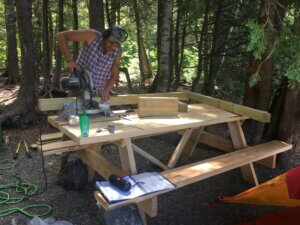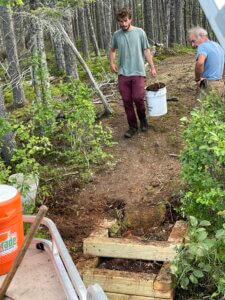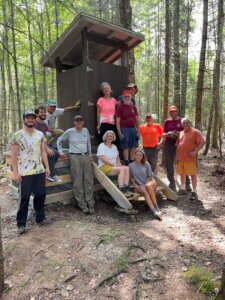A multi-year partnership between the Maine Bureau of Parks & Lands, local landowners and the Northern Forest Canoe Trail (NFCT) is enhancing outdoor recreation opportunities statewide.
Over the last several years, NFCT’s professional stewardship team has implemented projects that improve safe access to the woods and waters of the Northern Forest Canoe Trail, which travels through some of Maine’s most wild and scenic places. This work includes campsite upgrades, new boat access points and improved signage. Guidance from the Maine Bureau of Parks & Lands, the support of property owners, and contributions from volunteers and funders resulted in a collaborative effort that made it all possible.
“Stewardship is the heart and soul of our work,” said NFCT Stewardship Director Noah Pollock. “Maine comprises half of the 740-mile canoe trail — taking care of our waterways and maintaining infrastructure across such a vast, wild landscape requires strong partnerships between stakeholders. We need generous landowners to provide easements and access to stewards and users, and we need the backing of state officials to make sure we can carry out our work safely and in accordance with state laws and regulations. The end result is that outdoor enthusiasts from all walks of life can paddle, fish, hunt and enjoy these lands forever.”
“The Maine Bureau of Parks and Lands and the Northern Forest Canoe Trail share the privilege of managing recreation experiences in Maine’s iconic northern forests,” said Rex Turner, outdoor recreation planner at the Maine Bureau of Parks and Lands. “We both foster paddlers having deep relationships with the waters flowing through one of America’s truly great landscapes. The work is rewarding, but its scope is challenging with limited resources. The collaborative work accomplished by NFCT staff and volunteers assists the Bureau as we try to keep up with growing stewardship needs and increasing public use. The NFCT has been and is anticipated to remain a valuable partner in helping improve water-based outdoor recreation in Maine’s northern forest.”
Recent accomplishments
 In 2022, the NFCT worked primarily on Long Pond and Moosehead Lake, emphasizing projects that promote a variety of recreational uses.
In 2022, the NFCT worked primarily on Long Pond and Moosehead Lake, emphasizing projects that promote a variety of recreational uses.
On Long Pond, a scenic and historic waterway east of Jackman, NFCT crews and volunteers built two new campsites, complete with tent pads, picnic tables and moldering privies, a project performed with support from the Maine Outdoor Heritage Fund and the Davis Conservation Foundation.
“Long Pond is an extension of the Moose River as it flows east of Jackman,” said Pollock. “It’s a beautiful lake — long, fairly wild and mostly undeveloped. Prior to last year, there were no formal campsites on the lake. There had been one informal site that people used, but it had no signage, inadequate tenting areas and no sanitary facilities.”
With support from the Maine Bureau of Parks & Lands, the NFCT identified these campsite locations for improvement and the two parties worked to formalize them.
One campsite is known as “The Narrows” and is situated on a beautiful beach that faces west, nestled under a cedar forest. Informal use over the years had caused degradation in the tentings areas, so the NFCT constructed tent pads to provide a more level tenting area, installed a box privy to manage human waste, and added a picnic table and wayfinding signage.
On Long Pond’s north shore, similar work was performed on a new campsite, with the addition of a stone staircase, a fire ring and a kiosk.
“Now we have two beautiful campsites for users to enjoy,” Pollock said. “There can be a lot of traffic on the Moose River Bow Loop trip to the west of here, and it can be hard to find sites on summer weekends. These news sites give folks an opportunity to explore an equally scenic place and also protect the land against degradation in the future.”
O n the western shore of Moosehead Lake, stewardship crews upgraded several NFCT and state-owned campsites, including new privies, picnic tables and access stairs. This work was also carried out with support from the Maine Bureau of Parks & Lands and the Maine Outdoor Heritage Fund, and in partnership with the Appalachian Mountain Club (AMC).
n the western shore of Moosehead Lake, stewardship crews upgraded several NFCT and state-owned campsites, including new privies, picnic tables and access stairs. This work was also carried out with support from the Maine Bureau of Parks & Lands and the Maine Outdoor Heritage Fund, and in partnership with the Appalachian Mountain Club (AMC).
A portion of the work occurred at two NFCT campsites situated on private lands: one on Brassua Lake, and another on Baker Brook.
“These sites were set up on private land over 10 years ago and were long overdue for maintenance,” Pollock said. “There was a lot of blowdown, rotted boards on picnic tables, and the sites themselves — as well as the privies — were difficult to find due to poor signage.”
Over the course of several days last summer, the NFCT replaced infrastructure and installed tent pads: they were later joined by crews from the state and AMC as well as volunteers to install privies. Additional work was performed on Kineo Islands where, with permission from the state, stewards added a two-bin moldering privy, which allows for above-ground compositing and better protects water quality compared to traditional pit toilets.
“This was the first two-bin moldering privy installed on public lands in Maine,” Pollock said. “We’re excited to bring this approach to campsite management.”
On Farm Island, stewards assisted with clean up of old farm debris, including sheet metal, old tubs and appliances.
Upcoming projects
The NFCT will continue improving recreational opportunities on both public and private lands in Maine this summer.
 At the end of July, NFCT’s professional crew and volunteers will converge at the Rapid River Carry to complete critical maintenance of a portion of a historic portage that connects Umbagog Lake and the Rangeley Lakes region. Working in partnership with the Rangeley Lakes Heritage Trust, this project will replace failing bridges, resurface rocky sections, and establish a new take-out and improve signage.
At the end of July, NFCT’s professional crew and volunteers will converge at the Rapid River Carry to complete critical maintenance of a portion of a historic portage that connects Umbagog Lake and the Rangeley Lakes region. Working in partnership with the Rangeley Lakes Heritage Trust, this project will replace failing bridges, resurface rocky sections, and establish a new take-out and improve signage.
In early August, work on the western shore of Moosehead Lake will continue with the development of two more campsites. The project involves clearing downed trees, constructing tent pads, assembling privies and picnic tables, and installing signage. These will be the first two state campsites along the lake’s protected western shore, creating a safe haven: currently paddlers must cross to the lake’s islands or eastern shore to find camping opportunities, which is dangerous during windy conditions or inclement weather.
Finally, the NFCT is spearheading a project to rehabilitate the Northeast Carry, a historic portage trail that connects Moosehead Lake to the West Branch of the Penobscot River. Working with the landowner, local contractors, NFCT’s stewardship crew and volunteers, the plan includes installing a gate and rock barriers to seasonally restrict motor vehicle access, replacing failed culverts, resurfacing the trail to reestablish appropriate cross slopes and restoring a 125 foot section of the original route that had been abandoned and overgrown.
“Our vision is to bring the highest quality outdoor recreation infrastructure possible to Maine’s public lands,” Pollock said. “We’re grateful to our public and private partners for clearing the way so our staff and volunteers can do what they do best. We can’t wait to see what the future holds.”
To learn more about the NFCT’s stewardship program, contact Noah Pollock at noah@northernforestcanoetrail.org, or visit northernforestcanoetrail.org. For more information about Maine Bureau of Parks & Lands, visit maine.gov/dacf/parks/about/public_reserved_lands.shtml.